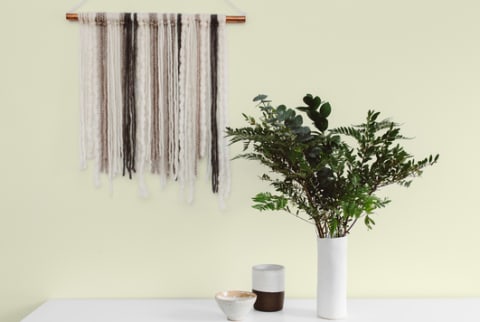Advertisement

Although the key end goal of tidying your house is clearly to have a more organized, mess-free lifestyle, the current KonMari decluttering craze is keen to stress that tidy homes actually bring positive repercussions outside the kitchen and living room.
Japanese tidying consultant Marie Kondo’s best-selling books The Life-Changing Magic of Tidying Up and Spark Joy discuss in depth the joyful side effects a "tidying festival" can bring. Marie writes about how tidying has helped past clients find purpose, gain confidence, become happier, and even reduce anxiety. But there’s one other quality that is perhaps less explicitly stated in her books — thankfulness.
By confronting your possessions and determining which items "spark joy" and which don’t, you’re not just tidying but also cultivating a sense of gratefulness and fulfillment for the lifestyle you lead. Here are four ways Marie Kondo’s KonMari Method promotes gratitude:
1. You will learn that even utilitarian objects can spark joy.
As you probably have heard, a key point of Marie Kondo’s philosophy is that you should discard things that don’t spark joy. But what about essentials like cooking utensils, toiletries, or cleaning supplies? Although you may not think they bring you joy, try looking at them a little bit differently.
Do they make your life easier in some way? Keep your teeth clean? Help you clean the floor? Through learning to be thankful for these objects, your perspective will shift. As she says, "the things we need definitely make our lives happier."
2. The tidying "festival" will change the way you think about abundance.
Marie tells you to individually touch all your possessions to determine which objects bring joy and which don’t. But if getting rid of all your less-than-joyful objects sounds like you’ll have nothing left at the end, think again.
No matter how much you’ve discarded, your philosophy on what you "need" will have changed — you not only learn that what you have is just enough, but also recognize a sense of abundance and thankfulness when you look around your home and only see "joyful" things.
3. Honing the objects you surround yourself with will teach you to live in the present.
When going through the KonMari Method (as Marie calls it), you might come across materials or equipment from a project or hobby that you’ve neglected or since moved away from.
But instead of feeling guilt or sadness when confronting that unused yoga mat or tennis racket, discard it with purpose — you may have enjoyed them (or, at least, the idea of them) in the past, but in getting rid of them you are making space for the hobbies you’re pursuing now, in the today. Don’t feel guilt for refusing to live in the past, feel grateful for the present.
4. Your purchases going forward will be more deliberate.
Once you’ve completed the method, it doesn’t end there. In going through the KonMari Method, you will have honed your "joy sense"; that is, the way you determine whether or not something sparks joy. Instead of going on shopping sprees you later regret, you’ll know ahead of time whether or not a prospective purchase will bring you joy when you bring it home.
In this way, you’ll only acquire things that spark joy and continue feeling grateful and happy for the items you’ve chosen to surround yourself with every time you walk in the door.
